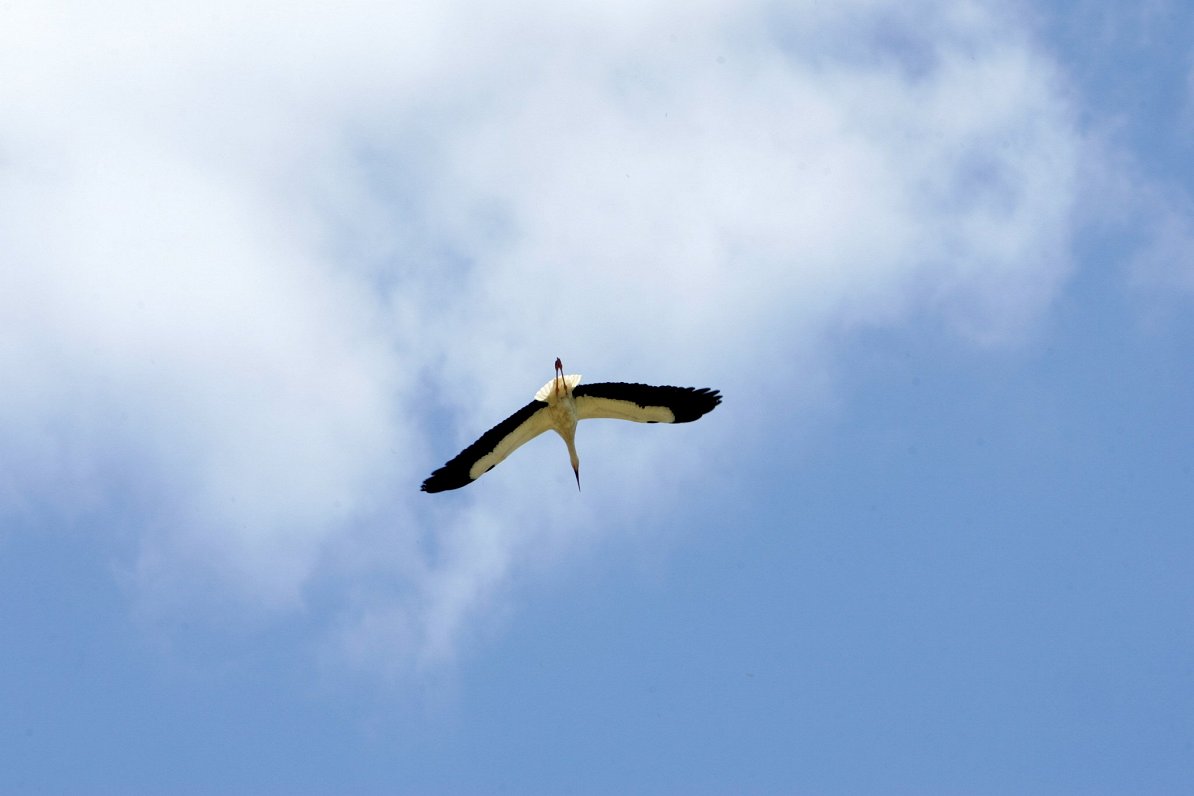This year, as from time immemorial, by the beginning of September, all the strongest and most prepared storks will have already flown away.
At the end of August, storks leave Latvia on their way to Africa or other warm countries. If one is still found here in September, it is suspicious and most likely something is wrong with the bird. However, feeding it or trying to help it hibernate in any other way is definitely not necessary, ornithologist Arnis Zacmanis and representative of the Riga Zoo Māris Lielkalns pointed out in the Latvian Radio program "Ķepa uz sirds".
"Storks are such lazy fliers, they wait until the thermal currents form at the end of August. We see them as beautiful cumulus clouds. Then they use these currents to take off and circle in the sky – not actively flapping their wings, but gliding to the next place where they find such a rising current again," explained Zacmanis.
There is a certain time when the conditions for the long flight to the warm lands are most suitable, and those storks that fly all the way to southern Africa fly out at quite precise times – just like according to a calendar.
"Birds that winter closer, in Western Europe, they are watching. There are species [of birds] that may not move until the snow starts to fall on their heads. However, if the stork is still here after the first of September, then it is already suspicious. It is likely that he has a problem," said Zacmanis.
The lingering stork will, of course, try to survive the winter as best it can, and nowadays this is no longer impossible, as there are many different feeding places available even in winter, such as garbage dumps.
"People often think that birds are terribly cold, of course they can be, but studies show that most bird species can withstand temperatures of even -60 degrees Celsius if the bird is well fed," said Zacmanis.
However, it is important to note that if you encounter a stork in autumn or winter, you should not try to feed it yourself. It is very likely that the stork will not know what to do with the food given by people, because it is used to its prey moving, Lielkalns pointed out. If the stork has learned from childhood what a bowl and human food is, then of course it can be different, but feeding storks should definitely not be done as a rule.
"No matter how harsh it is, the best thing in these cases would be to let him fight on his own," emphasized Lielkalns.
In recent decades, more and more storks choose not to fly to the distant wintering places in Africa, but to settle in Southern Europe.
"Let's say they can live in some dumps in Spain, Portugal, and in this way they save a lot of distance, reduce the risks of flying over the Sahara, and so on. It's easier for birds that don't fly further in the winter to return to their nesting place, and then they're stronger, better fed, they don't need to rest after flying, and they are able to breed better," explained Zacmanis.
Storks are not endangered in Latvia. Researchers estimate that there are about 13 thousand pairs of storks nesting here, but in addition to them, there are also numerous young birds that have not yet formed a pair.
"People ask why flocks of storks are sometimes found during nesting, why they don't fulfill their direct duties, but storks can grow for several years. They don't nest the following year, and that's why there are young ones, teenagers who wander around," said Zacmanis.
He compared these storks to those young people who choose to travel a couple of years after finishing school, instead of immediately looking for a job and starting a family. Storks can also wander the world for several years, looking for their right place.
"The life of storks is not easy. Every stork who wants to start a family has to fight. It is very likely that he has to push another, weaker stork out of the territory," Zacmanis admitted.
Good luck to all Latvan storks, whether they leave or choose to stay here with us and tough out the winter...



























